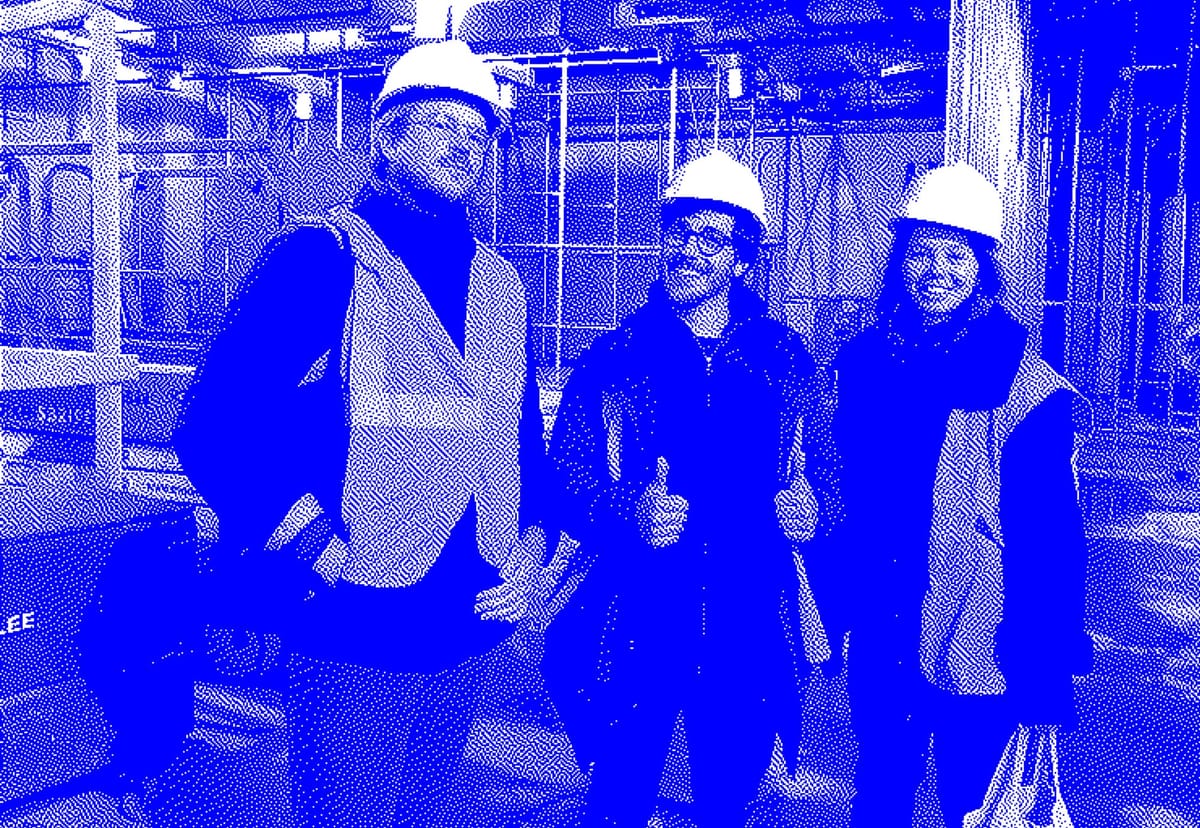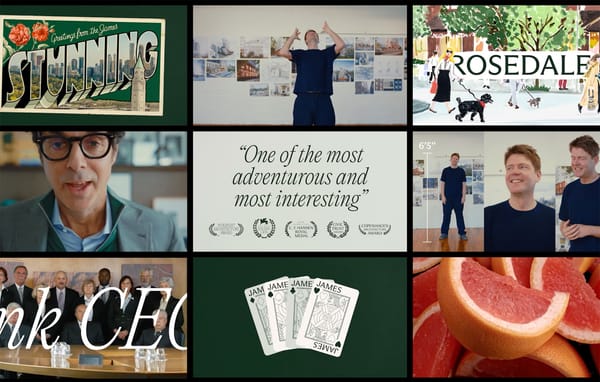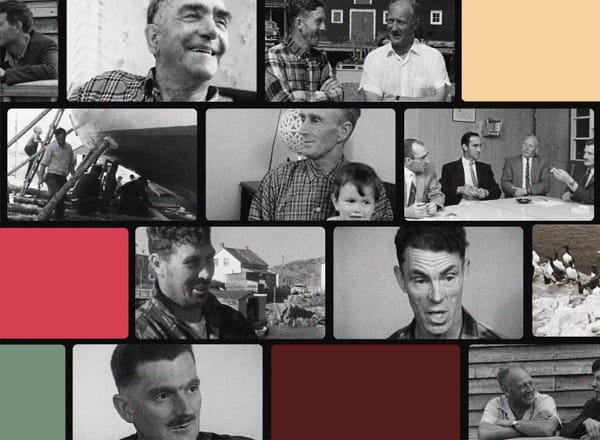Computing Environment
On running a business with candor and authentic communication about sustainability

Hugh Francis founded Sanctuary Computer, a technology shop in New York City that makes “artful software,” and Seaborne, a consultancy that guides digital companies toward sustainable business practices. In this conversation, we discuss big-agency burnout, running a business with candor, implementing carbon-offset initiatives, and authentic communication about sustainability.
Frontier: You’ve been transparent about Sanctuary Computer’s work, infrastructure, and economy. What led you to take that position?
Hugh Francis: I used to work at a big agency in New York. We worked with big brands, the kind that have funding and advertise all over the subway. We would often find ourselves working past midnight; we’d take turns sleeping on the couch as we prepared to flip the switch on a new website. I was twenty-three and didn’t mind. The technology was cool and it was in some sense fun. But there came a point when I thought, I don’t know how much money the company is making, or how much value I’m creating—and I’m working too hard not to know that and share in it. But I couldn’t get traction with the idea of profit-sharing. I also had some thoughts about how to produce high-quality technology work more efficiently, and those didn’t go anywhere either. So I left.
Because profit sharing became so important to me, creating an egalitarian profit-share program for Sanctuary Computer was an immediate priority. It couldn’t be a token of appreciation, a flimsy bonus. It had to be legitimate and my share had to be the same as everyone else’s. Employees had to feel that if their work generated profit they would receive a fraction of that profit.
To do that honestly, you have to share the values of your contracts, let everyone know how much you’re charging per hour … you have to share everything. At first I was worried that they’d see I am charging clients double what I pay them and get upset. But when you share everything, including all the company’s costs, and respect their intelligence, they can appreciate the decisions you’ve made and work toward making things even better for the company. You’ve treated everyone as peers and have aligned everyone’s incentives with the company’s. Everyone wants to create the best-quality work without stress.
This makes running the company drastically easier. I don’t spend time negotiating salaries; they don’t spend time worrying about what the person in the next seat is making. If you can prove your process is fair, everyone sleeps well. The radical transparency lets everyone focus on the work.
Frontier: In early 2020, you chose to “refocus the studio on doing work that causes no major damage.” I assume this was a gradual process, but was there a specific precipitating event?
Francis: The most important thing was arriving at a place of stability with the company. We are able to care about more than just getting paid. We are in a privileged position to think like this. That doesn’t mean others shouldn’t think like us, but rather that we first worked on making the company efficient so we could create the headspace to think about new approaches.
I don’t know if there was one knife-edge moment. I am Australian, I am a Bernie supporter, I am socialist-leaning and proud of it. I began reading many doomy books about climate change and learning just how much carbon is required for every little aspect of our lives. When you couple that with living in a country that has actively moved away from addressing the climate crisis, well, you can’t help but think about it—a lot. You begin to see the damage in everything: the chair in front of my electric piano here at home, the piano itself … all I see is carbon.
So I looked at my own consumption, switched to a plant-based diet and wind-generated electricity in my home. And I felt pathetic! There’s nothing I can really do! But then I realized I’m in rooms—or, now, in Zoom rooms—all day with company founders trying to figure out how to bring products to market, how fulfillment works, how online-checkout processes work. I’m part of whether those businesses succeed. I realized that I could stipulate to potential clients that if they want to work with Sanctuary Computer they have to demonstrate sustainability awareness, at a minimum. That helps me have a far greater effect than I do as an individual. If my company helps create money machines that trash the planet, thanks to the power of Shopify, I realized I should probably try to do something about it.
Frontier: And how have your employees responded to this development? How will Seaborne affect Sanctuary Computer’s business?
Francis: Everyone who works at Sanctuary, by virtue of the vibe we project—transparency, egalitarianism, Socialist-leaning politics—everyone here is mission-driven. They care about the stances we take and using our collective power for collective good. And they were excited because they were feeling some of the same burnout and helplessness that I was feeling.
Separately, we’ve realized launching Seaborne will be good for the company. Before the pandemic, when we began looking into our own carbon footprint, we realized quickly that no existing consultancy fit well with our work and outlook. There are a lot of “green” consultancies out there, but none focus on modern internet businesses, DTC products, SAAS companies. So we began doing research into consumers’ awareness of sustainability and realized that the numbers are there: 80% of millennials and Gen Z youth care deeply that the companies they buy from have sustainability initiatives and are working to repair the environment. They will pay more for sustainability. They are influential early adopters.
We needed a sharp tool to share these insights with founders so we can ask them, “Is your product sustainable? Are you thinking of your environmental impact?” If they say no, then we say: work with Seaborne.
We funded our year-long research into the environmental impact of the Light Phone. It wasn’t cheap, but now we can speak intelligently about how to generate a carbon-footprint report for a cell phone. If you’ve done that work, you can carbon-footprint, say, a DTC soda can. This environmental consulting adds to what we can offer businesses and will make our company more profitable.
Frontier: What is the biggest unintended environmental consequence of running a digital business?
Francis: Bandwidth. If your service, which is probably in the “cloud,” generates its value by sending electrons out into the world and receiving them back, you are burning carbon. When we did Sanctuary Computer’s carbon-footprint research, this was 38% of our carbon usage. The other thing we found is flights. I flew back and forth to China and Taiwan a lot while we worked on the Light Phone and it put a tremendous amount of carbon into the air. If you’re a web-focused business your carbon footprint is coming from your servers and from airplanes.
Frontier: What are some of the best ways for brands to communicate the importance and depth of their sustainability initiatives?
Francis: It’s different for every company. Everything depends in part on your brand, how it communicates, how much you want to invest in sustainability. You should expect to spend about one percent of your revenue on sustainability initiatives if you want to be carbon-neutral. That’s nontrivial, but it’s not much in the grand scheme of things.
If you’re willing to invest that amount, it’s important to say that loudly and with confidence. Saying you plant trees when you fly around the world is a weak signal. It helps, incrementally, and is better than doing nothing at all. But it can also hurt the broader goal because consumers are savvy and can recognize inauthentic commitments. If you want to do sustainability right, you should probably be able to produce a ten- or twenty-page scientific report that analyzes and explains how you’ve optimized your work and chosen the initiatives you support. Creating these reports is the low-hanging fruit, the baseline of what Seaborne has to do.
Frontier: Stripe recently announced Stripe Climate, which allows businesses using its payment-processing services to easily direct a fraction of revenue toward carbon-removal projects.
Francis: And I have two different feelings about it. On its face, it’s a good initiative. But if you use the service, you’re essentially paying to not think about your impact, throwing money at your guilt. If I do this one thing, the thinking might go, I can keep doing what I want without thinking about the incremental and sometimes hard changes necessary to improve my company’s environmental impact. We won’t beat the unfathomable “bigness” of climate change this way. People need to consider their impact with the same detail as they do their products, their own tax returns.
The other side of the coin is that carbon draw-down technologies are currently too expensive. We can’t roll them out at scale because the return on investment won’t be there. Stripe is attempting to make drawing carbon out of the atmosphere cheaper by investing in companies that are researching innovative approaches to the work. They aren’t just buying offsets. Today carbon draw-down can cost more than $500 per ton. How can we get that below $100 per ton? That’s where the unit economics of drawing down carbon begin to work. The challenges we are facing now take a lot more than planting trees.
Many people say you shouldn’t be political at work and I couldn’t disagree more. You can’t separate the impacts of your personal choices from the impacts of your work. It’s too late for that.





